How Canada came to export a sex offender
For years, Canada bungled the infamous case of Ernest Fenwick MacIntosh. Then he travelled to Nepal where he was promptly charged, tried and convicted.
Ernest Fenwick MacIntosh is escorted in custody by RCMP officers at Robert L. Stanfield International Airport in Halifax on Thursday, June 7, 2007. A Nova Scotia man has been sentenced to four years in prison for sex offences against boys that date back to the 1970s. Andrew Vaughan/CP
Share
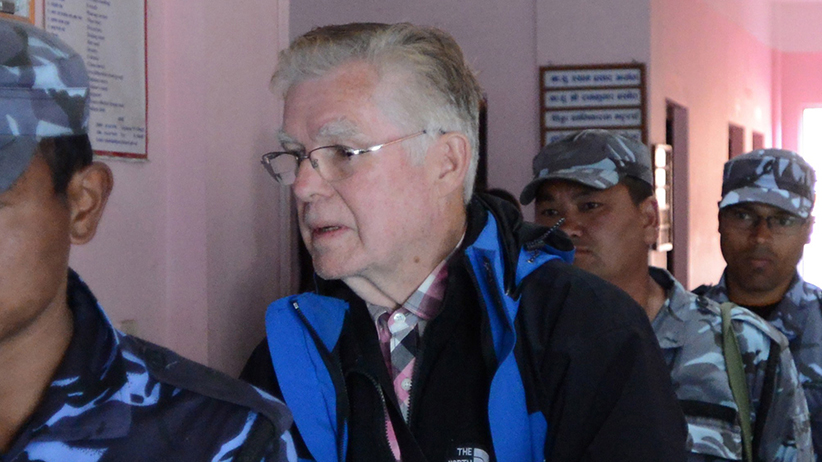
Update, March 5: Nova Scotia Justice Minister Lena Diab announced this morning that time restrictions will be removed from the Limitations of Action Act. The amendment will allow historic victims of sexual abuse to sue.
Last Sunday, hours after Ernest Fenwick MacIntosh was sentenced in Lalitpur, Nepal to seven years in prison for sexually assaulting a nine-year-old boy, Bob Martin sent an email to the Kathmandu police: “Great work Nepalese public police and district court,” he wrote, “Nepal 1—Canada 0. You get the gold in Justice Olympics.” The sports analogy was apt. The Port Hood, N.S., photographer, one of four boys MacIntosh was convicted of sexually assaulting in Port Hawkesbury, N.S., in the 1970s, had come to see bringing MacIntosh to justice as a losing game, an unending marathon that began when he was a teenager, more than 40 years ago.
The speed with which the 71-year-old Nova Scotia man was brought to justice in Nepal—arrested in mid-December 2014, days after the boy went to police, sentenced on March 1—stands in stark contrast to how the MacIntosh case played out in Canada: the first complaint was made in 1995; 15 years later he was convicted on 17 charges related to sexual assault. The glacial pace—which would be attributed later, in internal provincial and federal government reviews, to bureaucratic bungling—gave the Nova Scotia Court of Appeal grounds to determine that MacIntosh’s right to be tried within a “reasonable” time had been violated, a ruling upheld in 2013 by the Supreme Court of Canada.
The story of how Canada exported MacIntosh to do global damage is not simply a tale of massive administrative failure. It begins with residents of a small Cape Breton town exercising wilful blindness toward a politically well-connected, well-off citizen at a time sexual assault was less understood; it includes a federal government that allowed a man charged with sexually assaulting children to keep his passport and to be issued new ones, and a provincial government that refuses to look back even now. MacIntosh’s arrest in Nepal thrust an international spotlight on a debacle many want to forget: “The whole system in Canada was asleep,” an unnamed New Delhi policeman told the Inverness Oran in February. Gar Pardy, a retired federal bureaucrat who tried to have MacIntosh’s passport revoked in the 1990s, sees the case in epic terms: he likens it to Charles Dickens’s Bleak House, the classic tale of a tortuous legal process that changed nothing.
Like Bleak House, the MacIntosh story left a legacy of devastation. MacIntosh’s alleged victims are spread across the country and beyond. One is homeless in Edmonton; many are addicted to drugs or alcohol. Dale Sutherland, the first of MacIntosh’s Port Hawkesbury victims to go to police, says he was “gutted” by his tireless 20-year quest to bring MacIntosh to justice in Canada. It “ripped the hell out of my marriage,” says the Dawson Creek, B.C., resident. “I have PTSD, I have anxiety disorder, I have depression, and I’m doing better than most of the other guys.”
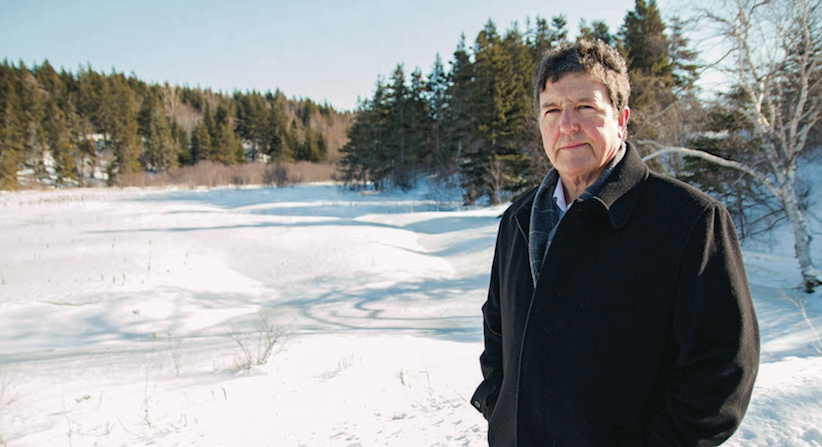
A Google alert informed Bob Martin of MacIntosh’s arrest in Nepal, news that came like a punch to the gut, he says: “The first thing I thought was, ‘Oh God, how many boys did he go through over there?” Martin recounts the tale over dinner in late January in an Antigonish, N.S., restaurant. He’s chosen the corner seat, next to his wife, Lynn. It’s the legacy of his sexual abuse, he says: “I need to have my back [to the wall]. I have to know I’m safe.”
Martin hands out a card that reads “Advocate for survivors of sexual abuse” that features a photograph of him as a sweet-faced Grade 6 student, before the abuse began. “My goal is to raise awareness regarding Fen MacIntosh and pedophiles,” Martin says. That quest broadened after the charges were laid in Nepal; Martin and Sutherland organized transcripts of the original case to be translated into Nepalese, information that would be quoted by the judge and in the Nepalese press.
Martin’s current quest is “to turn up the heat on lawmakers in Nova Scotia who are asleep at the wheel,” he says. Even now, the provincial government wants to ignore the MacIntosh case, Martin says, citing the Limitation of Actions Act passed in November. It removes time limitations on sexual assault victims’ ability to sue with one caveat: only those victimized after the act became law are eligible; historic victims have strict one-year time limits.
Martin went public as a MacIntosh victim last October, lifting a publication ban that rendered him “R.M.M.” in court documents. Anonymity began to feel like secondary victimization, he says. “I’d be told to turn my back to be filmed in silhouette in media interviews. I wasn’t a person.” Since then he has received more than 2,000 emails and hundreds of calls and letters from men and women, he says, among them 120 men who allege MacIntosh also abused them.
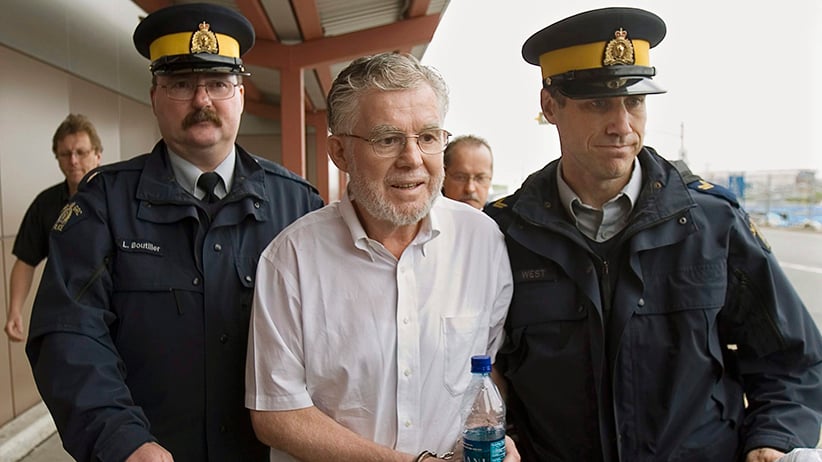
MacIntosh’s two 2010 trials were big news in Cape Breton. That the story didn’t make national headlines suggests a sexual-abuse-of-young-boys ennui in the wake of a deluge of allegations involving coaches, priests and residential schools; the case dated to the ’70s; the victims were now middle-aged men. MacIntosh presented as the by-then familiar textbook case of a child sexual abuser operating in plain sight: the Port Hawkesbury businessman ran a string of enterprises, including Fentronics, an electronic communications company. Word around town was that he made a bundle on satellite technology. He was politically well-connected, running for the Progressive Conservatives provincially in the Guysborough riding in 1974, coming in second. As an executive with the Strait Pirates Junior B hockey team, MacIntosh drove boys to out-of-town games and housed players in a rooming house he co-owned—“a melting pot of pedophilia,” says Martin.
MacIntosh ingratiated himself into Sutherland’s household of four boys, Sutherland says: “My parents saw him as one of their best friends.” His MO was to prey on boys as their sexual identity was emerging, says Sutherland. When he was nine years old, roughhousing turned to assault, he says. “I didn’t know what the hell he was doing.” Because he got an erection, he felt complicit—and embarrassed. That it felt good confused him further.
Martin also speaks of the abuse in unflinching terms, occasionally shifting into third person. MacIntosh was not the first man to sexually abuse him, he says, naming a local bandleader. His childhood was unstable. At 14, he was sent to live in a foster home after coming to blows with his stepfather, who was physically abusive to his mother. He met MacIntosh shortly after, in 1972, when Martin was working part-time in the dark room of the Scotia Sun newspaper. MacIntosh then hired him to work at his laundromat.
“He was a snappy dresser, a charmer, a clean freak,” says Martin, who notes MacIntosh used his boat, car and alcohol as bait. A defence lawyer at the 2010 trial asked him: “Why did you get in the car with Mr. MacIntosh?” he recalls: “I told him, ‘I was 14. He had a convertible. He let me drive. He bought me beer. Who wouldn’t get in the car with him?’ ”
People in Port Hawkesbury chose not to see. MacIntosh was dubbed “Fruity Fen,” says Sutherland, who believed it was easier to look away because boys were involved: “If he was messing with 12-year-old girls he’d be called a pervert and have the s–t kicked out of him. Because he was messing with boys, he was called a ‘fruit’ and we were called ‘fruits’ and punched out.”
The law caught up with MacIntosh in the early ’80s after he moved from Cape Breton: in 1983, a conviction of indecent assault in Happy Valley-Goose Bay, N.L., resulted in a suspended sentence and probation; a sexual assault conviction in Dartmouth, N.S., in 1984 landed him a $500 fine and three years’ probation. RCMP documents do not reveal names or ages of the victims.
MacIntosh moved between Ottawa and Montreal in the late ’80s and continued to cultivate high-placed connections: Russell MacLellan, Liberal MP for Cape Breton-the Sydneys and later premier of Nova Scotia was the guarantor of his 1987 passport.
MacIntosh was living in New Delhi, working for a telecom satellite company, when Sutherland went to the B.C. RCMP in 1995. His wife, a social worker, convinced him MacIntosh was a risk to children, he says. The Port Hawkesbury RCMP laid two charges related to sexual abuse against MacIntosh on Dec. 4, 1995.
Sutherland became relentless, writing letters to provincial and federal politicians, including prime minister Jean Chrétien and justice minister Alan Rock in 1996; both sent boilerplate responses. Martin came to the ongoing case as a fluke: he occasionally worked with the local RCMP processing photographs; one day, he identified MacIntosh in a photo. That night, an officer paid him an official visit. Then 39, it was the first time Martin had told anyone of the abuse. (By 2001, the Crown’s case involved six complainants.)
According to an internal Passport Canada email dated Nov. 19, 1996, MacIntosh’s name was to be added to the passport control list. Yet MacIntosh renewed his passport in India in May 1997. When Sutherland learned this, he contacted Gar Pardy, then director-general of Canada’s Consular Affairs Bureau, who wrote to Passport Canada requesting MacIntosh’s passport be revoked.
That never happened. While MacIntosh stayed put in India, his lawyer successfully appealed the passport revocation in Ottawa, despite a Canada-wide arrest warrant. Among arguments to support MacIntosh keeping his passport to the federal government, his lawyer noted in a 12-page letter dated Dec. 1, 1997, that for “many years Mr. MacIntosh held a Top Secret security clearance issued by the Government of Canada.”
The case was heard on Jan. 20, 1998, by Justice P. Rouleau of the Federal Court of Canada. In his decision the next day, he stated there was “a serious issue to be tried” but found the government, represented by junior government lawyer Anne Turley, did not provide evidence to support the revocation. The “only material submitted by counsel for the Minister was her interpretation of the facts, unsupported by any affidavit or documents,” he wrote. In other words, no Canada-wide warrant for arrest, no information about the outstanding criminal charges.
The judge ordered suspension of the revocation until May 26, 1998; he also ordered MacIntosh be cross-examined in Canada no later than March 30, 1998. MacIntosh didn’t comply. And the Crown didn’t wait for May. An April 16 letter to MacIntosh’s lawyer from Turley agreed to remove MacIntosh’s name from the passport control list and discontinue Passport Canada’s attempts to have his passport revoked. On April 20, MacIntosh’s lawyer and Turley filed a notice of discontinuance ending the judicial action. MacIntosh kept his passport, which was again renewed in 2002.
Why the government failed to present the court with available information to support passport revocation remains a mystery: “The judge gave every opportunity for the government to provide information,” says Pardy. A 2013 internal review by the federal Department of Justice refers to the government fearing a “precedent-setting loss” and that the passport revocation process would be seen “as a back-door attempt by Canadian authorities to force Mr. MacIntosh to return to Canada.” It also said if it “ had known then what we know now, we would have pursued revocation more aggressively in 1997 and 1998.” (Turley, now a senior lawyer in the Justice Department, declined Maclean’s interview requests.)
Despite a Canada-wide arrest warrant against him, the RCMP believed MacIntosh was travelling in and out of the country, according to a December 1997 passport office “minutes sheet.” Sutherland also reports a cousin, unaware of the charges, bumped into MacIntosh in the Paris airport in 2000 and asked about buying waterfront property MacIntosh owned in Nova Scotia. MacIntosh said he’d be in Montreal and gave him a phone number. When Sutherland learned of the meeting, he called the Port Hawkesbury RCMP. “I thought: ‘Finally, we got him,’ ” Sutherland says. The investigating RCMP officer called the Montreal number and left a message with a boy with an Indian accent asking MacIntosh to return the call. Sutherland was apoplectic when he heard: “I said, ‘Jeez. You did what?’ ” When the RCMP visited the Montreal apartment, there was no sign of MacIntosh.
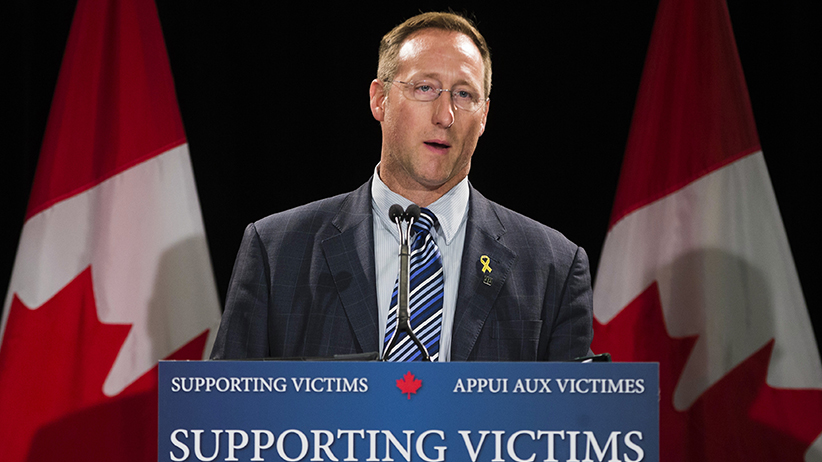
In 2005, Sutherland contacted Peter MacKay, MP for the Nova Scotia riding of Central Nova, who then sat in the official Opposition. MacKay, who first heard MacIntosh’s name when he was a Crown attorney in New Glasgow in the 1990s, sent letters to cabinet ministers, including foreign affairs minister Pierre Pettigrew and Irwin Cotler, minister of justice, arguing that the government move on extraditing MacIntosh. In July 2006—five months after MacKay’s appointment as minister of foreign affairs and eight years after the Nova Scotia government sent a letter to the federal government requesting extradition—a formal request for MacIntosh’s extradition was sent to India. MacIntosh was arrested on April 5, 2007, on 43 sexual assault-related charges. Sutherland says he received a telephone call from MacKay at 6 a.m. Pacific Time on April 6, Good Friday: “Peter said, ‘Dale, we finally got the bastard.’ ”
MacIntosh, extradited two months later, appeared in a Port Hawkesbury court that June. Legal wrangling ate up another three years. The first of two trials began in April 2010. MacIntosh admitted to some of the encounters but claimed they were consensual, and some of the boys were of legal age, then 14. He was found guilty of 17 counts involving four complainants; he was sentenced to four years in prison and would serve a total of a year and a half behind bars. Public outcry led to Nova Scotia’s Public Prosecution Service releasing a self-assessment in 2013 that blamed delays on myriad factors, but largely on the lead Port Hawkesbury Crown attorney’s crushing workload.
That year, Nova Scotia justice minister Ross Landry apologized to MacIntosh’s victims, calling the case “disturbing and unacceptable.” He told the Cape Breton Post he’d never seen such systemic breakdown—as if people had nothing to do with it: “It’s a rarity, it’s almost like a perfect storm has come and created this situation.”
MacKay’s appointment as justice minister in July 2013 gave rise to hope he’d launch a federal inquiry. “Peter is the only politician who gets a passing grade on this,” says Sutherland. The MacIntosh file was the first MacKay asked to be briefed on. But an internal review commenced on Sept. 27 ended with a press conference in Halifax on Oct. 25, 2013—the day media was focused on Mike Duffy defending himself in the Senate. MacKay acknowledged the “traumatic impact of sexual abuse was compounded by systemic failure and human error” and expressed his “sincerest regret for the mistakes made by federal employees . . . and institutional failures that contributed to this travesty.” Yet he ruled out a federal inquiry. The press conference also highlighted improvements in the passport program and border-control systems. (Even so, borders remain porous: a recent report indicates Anthony Onyenagada, a Nigerian Catholic priest, was allowed to enter and exit Canada in 2013, more than a decade after he was charged by police in Woodstock, Ont., on 11 counts of sexual assault and his name put on a cross-country arrest warrant.)
Independent inquiries would have answered some of the many questions that riddle the case, says Toronto lawyer Jonathan Rosenthal, who represents Martin and other MacIntosh victims pro bono as legal spokesman for Beyond Borders, a non-profit that advocates against sexual exploitation of children. “But I don’t think anyone in government wants to know what those answers are,” Rosenthal says. Harris MacLean, a retired Port Hawkesbury RCMP officer who worked the case, says the Department of Justice in Ottawa dropped the ball: “They knew where this fellow was,” he says. “It could have been dealt with a hell of a lot quicker.” Sutherland is more scathing: “There are aspects of this that stink to high heaven.”
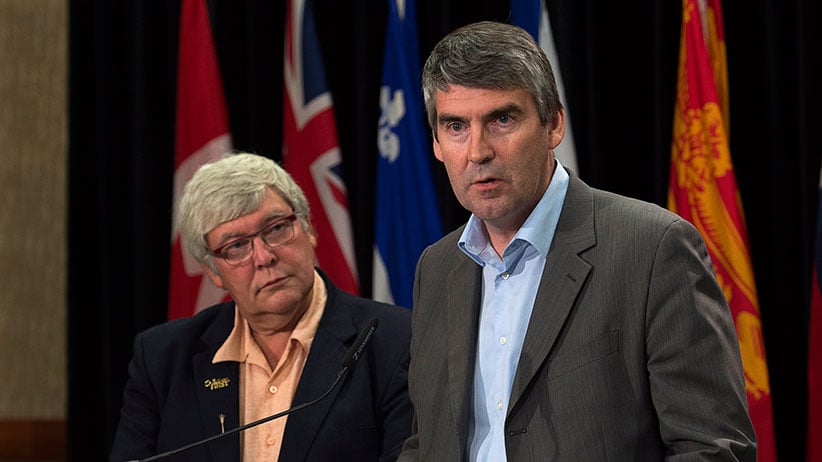
Martin remains dogged in his activism. Last November, he and five other alleged MacIntosh victims—Sutherland, Alvin MacInnis, Barry Sutherland, Jeff Hadley and Weldon Reynolds—bought one page in the Halifax Chronicle Herald to run an open letter to Premier Stephen McNeil to draw attention to the fact the Limitations of Actions Act puts those abused in Nova Scotia at further disadvantage: “Does it make any sense to you, Mr. Premier, that if we were abused in Newfoundland and Labrador or Saskatchewan or British Columbia or Ontario, we could sue our abuser, but as we were abused in Nova Scotia, we cannot?” Just before the Limitations of Actions Act became law in November, Conservative MLA Alan MacMaster countered with Bill 68, which removed time limits on historical sexual assaults; it was voted down by a majority Liberal government. The government’s resistance on the issue appears at odds with Premier McNeil’s 2013 campaign promise to offer reparation to former residents of the Nova Scotia School for Coloured Children; in 2014, his government issued a $29-million settlement. McNeil called the abuse “one of the great tragedies in our province’s history.”
Open letter to Premier Stephen McNeil
Making the law retroactive would open floodgates for high-profile cases that could prove embarrassing for the government, says NDP MLA Lenore Zann, who supported Bill 86. MacMaster plans to reintroduce his bill when the legislature reconvenes this spring.
Rosenthal remains leery that the bill will pass, even now: “They want this to go away,” he says. “They’re saying, ‘Let’s start with a clean slate; let’s forget the past.’ Well, explain to people who’ve been raped or abused how to do that.”
When Nova Scotia’s problem became Nepal’s, it surprised no one who knew MacIntosh. His involvement with schools on the subcontinent was known, even applauded. In 1989, the Ottawa Citizen ran a story about the “Ottawa electronics engineer” who volunteered at and raised funds for a school in the Himalayas run by a Jesuit; while there he taught “hygiene and English.” A 2007 Toronto Star story included allegations from two men in their 20s and 30s who said they were assaulted by MacIntosh as children when he was a visitor at their school, the Gandhi Ashram.
The Star also reported that MacIntosh sponsored a 15-year-old boy to Canada in 1990; he alleged he was sexually abused while staying with MacIntosh in Montreal.
The boy who MacIntosh sexually assaulted in Nepal lived at the Jesuit-run St. Xavier’s Social Service Center for homeless children. According to local reports, the boy—who is missing part of a limb—was offered gifts, money and a prosthetic by MacIntosh. The centre receives funding from Canadian Jesuits International, a Toronto-based charity. Its director, Jenny Cafiso, told Maclean’s she knew nothing about MacIntosh’s access to the centre until the news broke.
Bill Robins, a Winnipeg-born Jesuit priest who lives in Nepal and used to run the centre, has never met MacIntosh, he told Maclean’s. MacIntosh visited the centre in November, Robins says, where he talked to staff about helping and inquired about hiring an assistant for his spice business. “He never came without permission and the staff were always on duty,” says Robins, who claims “child protection systems” are in place. “We have a very strict policy for the Jesuits and all of our staff members,” he says, adding that the assault didn’t happen on school property.
MacIntosh is now confined in a penal system that Amnesty International considers one of the world’s harshest; it’s infamous for being overcrowded, dangerous, unsanitary and an incubator for disease. That he was set free by Canada to be incarcerated somewhere worse brings an ironic coda to a case few see as over. MacIntosh has 90 days to appeal. In another ironic twist, MacIntosh will likely need to renew his Canadian passport while in Nepal, which could prompt the Nepalese government to send him back in Canada.
When told of MacIntosh’s arrest in January, MacKay said in a statement to CTV that he was “dismayed to hear that another child has been victimized,” and that he knew the “devastating history” surrounding MacIntosh and how “numerous victims and their families continue to struggle to overcome the horrendous abuse endured.” He promised to support Nepalese authorities “to see that justice is done.” It’s not clear whether the Justice Department played any role. This week, a spokesperson said such information is “confidential” and that it would be “inappropriate to comment” since the case is in the appeal period.
News of MacIntosh’s incarceration makes Martin grateful but not celebratory. “Justice delayed is still justice for MacIntosh’s victims and all other victims I feel we finally gave voice to,” says Martin. Sutherland is not convinced the roller-coaster is over, he says, but expresses relief MacIntosh cannot harm other children “for now.” Retired Port Hawkesbury RCMP officer Harris MacLean expresses both relief and frustration: “I was glad there was justice for Bob Martin and his co-defendants,” he says. “But it’s sad, too. They shouldn’t have had to go to a Third World country to get justice.”